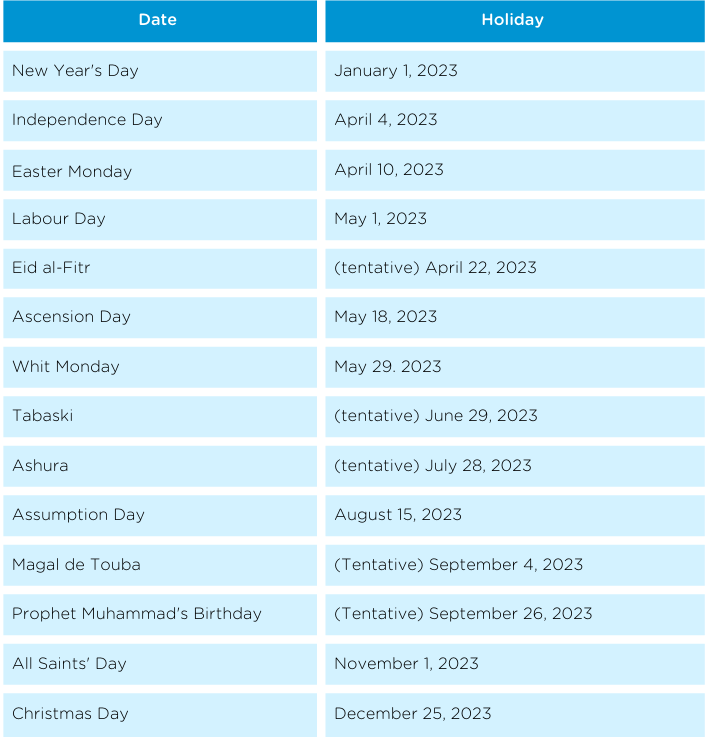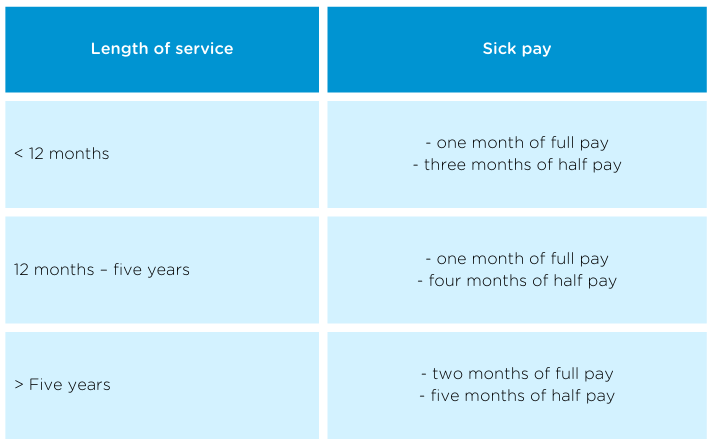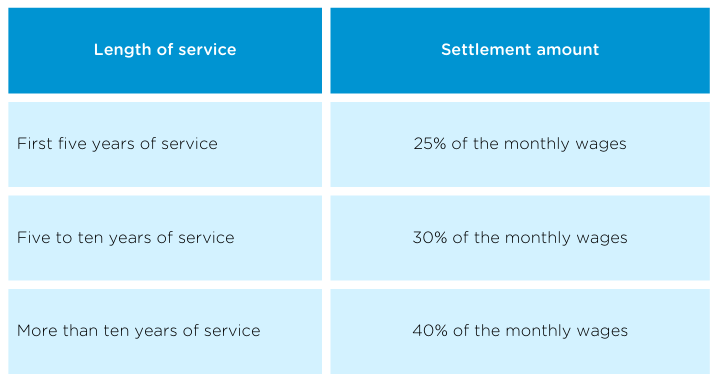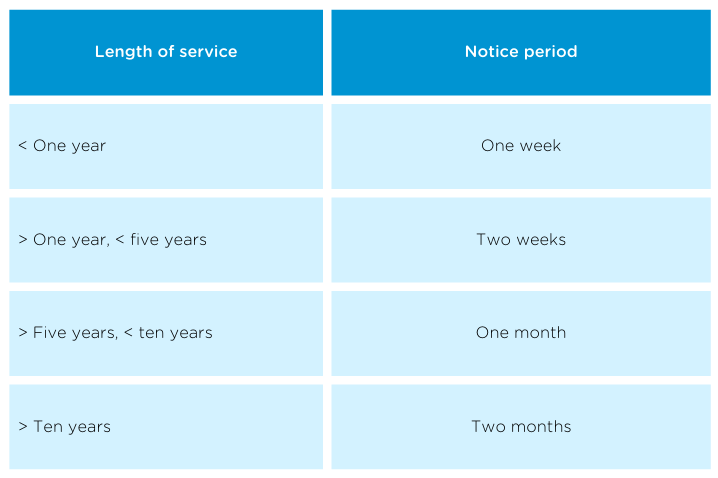
By
Leanna Seah
January 12, 2023
Updated
October 17, 2024

Overview
| Capital | Dakar |
| Languages spoken | French, Wolof, Pulaar, Mandinka, Balanta-Ganja, Mandjak, Hassaniya Arabic, Noon, Jola-Fonyi, Serer, Soninke, and Mankanya |
| Population size | 17.8 million |
| Payroll frequency | Hourly, daily, weekly, or monthly (subject to the terms of the employment contract) |
| Currency | West African CFA franc (CFA) |
| VAT | 10% for sales tax, 6% for service tax |

Payroll and taxes
Payroll and taxes in Senegal involve both employer and employee contributions.
Employer contributions
Social security contributions
Employers must make social security contributions for their employees, providing unemployment, old age, disability, and survivor's benefits. The employer contribution rate is typically around 20% of the employee's salary, and the employee contribution rate is typically about 5%.
Income tax
Employers must withhold income tax from their employee's salaries and pay it to the government on their behalf. The income tax rate in Senegal is progressive, ranging from 0% for low earners to a maximum of 35% for high earners.
Employee contributions
Income tax
Employees are required to pay income tax on their annual income. The taxable income rate is progressive, ranging from 0% for low earners to 35% for high earners.
Social security contributions
Employees must contribute to the social security system through deductions from their salaries. The employee contribution rate is typically around 5%.
Working hours
-
15% increase for the first eight hours of overtime
-
40% increase in real hourly wages for overtime, 60% increase for hours worked at night (between 10 pm and 5 am)
-
60% increase in hours worked on the weekly rest day or public holidays during the day
-
100% increase for hours worked on the weekly rest day or public holidays at night (between 10 pm and 5 am)

Source: Shutterstock
Minimum wage
The government sets the minimum wage in Senegal, which is reviewed and revised regularly. Senegal's minimum salary is 35,000 CFA francs per month for unskilled workers and 45,000 CFA francs per month for qualified workers as of 2021. The minimum wage applies to all workers, regardless of their status as blue-collar workers or white-collar workers, level of education, or experience.
Employee benefits
In Senegal, employee benefits generally consist of mandatory and supplementary/optional benefits.
Mandatory benefits
- Social security contributions: Employees and employers must make social security contributions, which provide for unemployment, old age, disability, and survivor's benefits.
- Annual leave: Employees get at least 24 days of annual leave per year.
- Public holidays: There are 14 public holidays in Senegal, and employees are entitled to paid days off.
Supplementary/optional benefits
- Health insurance: Some employers offer health insurance to their employees as an additional benefit.
- Housing allowances: Some employers offer housing allowances to employees as an additional benefit, particularly for those who need to relocate for their job.
- Transportation allowances: Some employers offer transportation allowances to their employees to cover the cost of commuting to work.
- Bonuses: Some employers offer bonuses to their employees, particularly around the holiday season or as a reward for meeting performance targets.
Types of leave available
Annual leave
Employees in Senegal are entitled to 24 days of annual leave per year. Mothers are entitled to an additional day of leave per year for each child under 14 years of age.
Public holidays
There are 14 public holidays in Senegal per year. Employees can be asked to work on public holidays, in which case they will be owed time off in lieu and will be paid 1.5 times their usual salary for the day worked.
 Table 1: Public holidays in Senegal
Table 1: Public holidays in Senegal
Sick leave
Sick pay is mandatory for the first six months of illness in Senegal. The amount of sick pay that an employee is entitled to depend on their length of service, as follows:

Table 2: Sick pay based on the length of service
Maternity/paternity leave
Male employees in Senegal are entitled to one day of fully paid paternity leave on the birth of a child after at least six months of service.
Female employees are entitled to 14 weeks of maternity leave, including eight weeks post-natal. The employment contract of a pregnant worker is suspended during pregnancy. In the case of illness arising from pregnancy or confinement, certified by a medical practitioner, maternity leave can be extended by an additional three weeks.

Source: Shutterstock
Background checks
In Senegal, employment background checks are optional for all employees. However, specific jobs or industries may require background checks as a condition of employment.
For example, jobs that involve working with children or vulnerable adults or require a security clearance may require background checks.
Employers in Senegal are generally free to conduct background checks on job candidates as part of the hiring process if they do so per relevant laws and regulations.
Employers must ensure that background checks are conducted fairly and not discriminate against candidates based on protected characteristics, such as race, religion, or gender.
Attracting talent
Attracting talent in Senegal can be competitive, as the country has a diverse and well-educated talent pool.
A strong employer brand
Having a strong employer brand is crucial for attracting top talent in Senegal. A strong employer brand helps establish a company as a desirable workplace and can help attract top candidates seeking meaningful work and opportunities for personal and professional growth.
To build their employer brand, companies in Senegal can also focus on promoting their company culture and values through their marketing and recruitment efforts. This may include sharing stories of employee success and highlighting the company's commitment to social responsibility and sustainability.
By building a strong employer brand, companies in Senegal can attract top talent and position themselves as attractive employers in the local market.
Importance of engaged employees
Employee engagement is an essential factor to consider when attracting talent in Senegal. In today's job market, employees are increasingly looking for meaningful work and personal and professional development opportunities.
Companies that can offer a positive work culture and opportunities for growth are likely to be more successful in attracting and retaining top talent. Companies can encourage employee engagement by promoting open communication and a collaborative work environment. This may include regularly soliciting feedback and ideas and encouraging employees to work together.
By fostering a positive work culture and offering opportunities for growth, companies in Senegal can attract top talent and improve employee retention.
Employee and market demands
The demands of the local market and potential employees in Senegal are also important considerations for companies seeking to attract talent.
Many job seekers in Senegal are interested in flexible work arrangements and the opportunity to work remotely. Companies offering these types of options may be more attractive to potential employees.
In addition, the focus on technological development in Senegal means that job seekers may be particularly interested in opportunities to work with cutting-edge technology and develop their skills in this area.
Competitive remuneration and benefits
Offering competitive compensation and benefits is vital in attracting top talent in Senegal. To attract top candidates, companies need to provide compensation packages that reflect the local market and meet the needs and preferences of potential employees.
This may include offering competitive salaries and benefits such as health insurance and housing allowances. In addition to traditional benefits, companies in Senegal can differentiate themselves by providing unique and attractive perks. For example, companies may offer additional time off, such as paid time off for personal or professional development activities.
By providing a comprehensive package that meets the needs and preferences of potential employees, companies can position themselves as attractive employers and successfully attract top talent.
Technological innovation as a step forward
Focusing on technological development can be an effective way for companies in Senegal to attract top talent. As technology continues to grow and evolve, many job seekers seek opportunities to work with cutting-edge technology and develop their skills in this area.
Investing in the latest technology and equipment may be the key which can help to attract top candidates interested in working with the latest tools and technologies. Companies can also offer training and education programs that allow employees to develop their technical skills and knowledge.
In addition, companies can focus on technological development by promoting a culture of innovation and continuous learning. This may include encouraging employees to explore new technologies and approaches and providing opportunities to experiment and learn from their successes and failures.
By focusing on technological development, companies in Senegal can attract top talent and position themselves as leaders in their industry.
Termination of employment
In Senegal, the rules and requirements surrounding the termination of employment depend on the type of contract of employment the employee has.
Fixed-term contracts
Employees are entitled to an indemnité compensatrice de congés, a payment for unused annual leave not taken throughout their employment. In addition, employees are entitled to an indemnité de fin de contrat, or termination settlement, even if the contract has been completed. This settlement equals the total gross salary earned by the employee multiplied by 7%.
The maximum fixed-term contract duration is two years, after which they become a full-time employee on an undetermined contract.
Undetermined contracts
 Table 3: Settlement for undetermined contract terminations
Table 3: Settlement for undetermined contract terminations
Termination settlement is defined by the duration of the employee's service as follows:
In addition to the termination settlement, employees are entitled to an indemnité compensatrice de congés for any unused annual leave not taken throughout their employment.
Probationary period
The general probationary period is one month (renewable once) for workers, supervisors, technicians etc., and three months (renewable once) for engineers and managers. No special rules or requirements exist for hiring or terminating probationary employees in Senegal. Employers are free to hire and terminate employees at will if they comply with relevant employment laws and regulations, including the minimum wage, social security contributions, and income tax withholding requirements.
Notice period
The notice period in Senegal varies depending on the worker category and the National Inter-professional Collective Convention. The notice period is three months for executive and similar workers and one month for non-executive workers.
In general, the length of the notice period depends on the length of the employee's service, with longer periods required for employees with more years of service.

Table 4: Notice period based on the length of service

Source: Pexels
What are my options for hiring?
Airswift offers several options for organisations looking to attract talent in Senegal to simplify the hiring process while remaining in line with local rules. Our extensive experience and skills reduce the risks associated with acquiring and onboarding the best talent Senegal offers.
Let us handle the administrative responsibilities, so you can focus on building your business.
Talent acquisition
Starting a business is usually a risky undertaking. That is why it is critical to have staff with the relevant expertise and competencies. In a competitive market, Airswift appoints a local talent acquisition expert to assist you in discovering high-quality applicants.
We also provide contract hiring for short-term projects and flexible employment options, so you'll never have to sacrifice quality for quick contract hire. Our network of highly skilled contractors ensures that your firm will only deal with the finest.
If you are looking for a more permanent employee, our professional recruiting services can match you with the most outstanding Senegalese talent that meets your needs.
Employer of record
If you want to hire people remotely but don't want a physical office, an employer of record (EOR) might be the answer.
A third-party employer of record (EOR) allows you to avoid the hassle of opening a local office and instead focus on running your company. They oversee things like paying employees' salaries and providing statutory benefits.
*Although the information provided has been produced from sources believed to be reliable, no warranty, express or implied, is made regarding the accuracy, adequacy, completeness, legality or reliability of any information. For the latest information and specific queries regarding particular cases, please contact our team.


